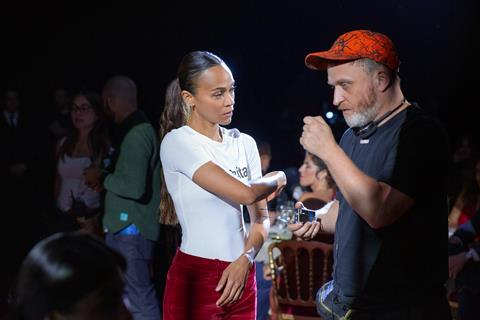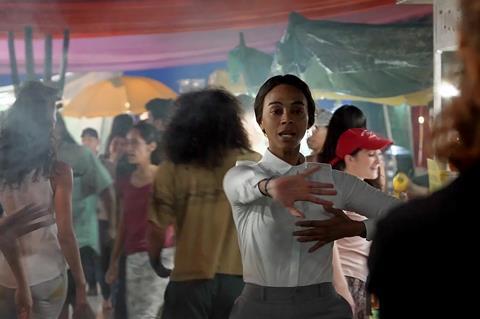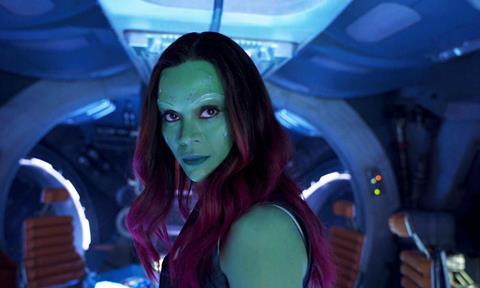The actress describes how being the daughter of immigrants gave her a special affinity for the role of Rita.

As someone who has “always felt like an outsider”, Zoe Saldaña was naturally drawn to Emilia Pérez, Jacques Audiard’s Mexico-set musical crime drama about a transgender cartel boss and the underappreciated lawyer she hires to help fake her death.
The project’s audacious use of music and dance, however, induced “a little bit of fear” when Audiard approached Saldaña to play lawyer Rita. “The personal thought process was, ‘Do I have it in me?’” admits the Dominican-American actress. “I was wondering whether, once I dusted off the cobwebs from my body and my vocal chords, I would really be qualified for it.”
She proved to be more than able, as evidenced by the acclaim the film has reaped since its debut at Cannes, where it was snapped up for North America and the UK by Netflix, and where Karla Sofia Gascon (starring as Emilia), Saldaña, Selena Gomez and Adriana Paz shared the festival’s best actress award. Subsequent plaudits for Saldaña include a supporting actress Golden Globe and supporting actress nominations for this year’s Screen Actors Guild, Bafta and Oscar awards.
Saldaña tapped into her own past to embody the loyal but restless Rita, identified in the script as Dominica-born but raised in Mexico. Born in the US and raised in New York by immigrant parents, Saldaña lived in the Dominican Republic between the ages of 10 and 17, being bullied and struggling to fit in thanks to her then less-than-fluent Spanish. “I’ve never felt more connected to my culture and more isolated as an alien,” she says of the period.
When she was preparing for the Spanish-language Emilia Pérez, “my psyche started revisiting these emotions and these experiences. I thought to myself, ‘God, do I have to call my therapist?’ But it was because I was channelling Rita. The Rita that I was meant to play had a lot of my life in her.”
Dance party

Preparing for the film’s musical numbers, many of which centre on Rita, was a different kind of process.
Though she studied dance and performed in musical theatre in her youth, at age 46, says Saldaña: “I can’t do 30 minutes of warm-up and just sprint right into choreography. So it was waking up my body and rehearsing extensively… only to then throw it all away, because it was about the moment that Rita is in and whatever Jacques wanted me to do at that moment.”
The approach is most clearly on display in ‘El Mal’, the kinetic, hip-hop style setpiece that is one of two numbers from the film up for this year’s Oscar for best original song.
Weeks of rehearsing the sequence gave Saldaña “a foundation I could lean on, and still step off from to improvise. So many things would just pop up on the day — for Jacques, for myself and for [choreographer] Damien Jalet, and you need to give yourself room for all those nuances because that’s where the magic happens.
“Magic for me is the combination of manual training and spontaneity due to emotions. One takes preparation and one just takes fearlessness. It was the combination of those that gave us ‘El Mal’.”
As well as acclaim (and 13 Oscar nominations in total, including for best picture), Emilia Pérez has drawn criticism from some quarters for its depictions of Mexico and the trans experience.
Saldaña acknowledges that the mostly French-produced film is “under a lot of scrutiny”. However, she adds: “This movie was made with love by so many individuals that took an interest in subjects and communities that are otherwise ostracised and isolated. And whether or not they are the right gender, the right age or the right race, they did have the right heart to tell this story.”
On a personal level, she says, involvement in the leftfield project has “given me the ability to reconnect with myself” in a life and career in which “art has been therapeutic for me”.
(Saldaña spoke to Screen before reports broke of controversial social media posts by Karla Sofia Gascon, and the distancing of the whole Emilia Pérez team, including Audiard, from the film’s leading actress. At a post-screening Q&A for the film after the posts were reported Saldaña said she was “still processing everything that has transpired in the last couple of days. It makes me really sad because I don’t support and I don’t have any tolerance for any negative rhetoric towards people of any group. I can only attest to the experience that I had with each and every individual that was a part, that is a part, of this film, and my experience and my interactions with them was incredibly about inclusivity and collaboration and racial, cultural and gender equity.”)
Franchise star
Up to now, Saldaña has been familiar to most audiences through her involvement in three of Hollywood’s biggest franchises. She has co-starred, in heavy CG disguise, in the first two Avatar films, with a third, Avatar: Fire And Ash, coming in December. She has been one of the title characters in all three Guardians Of The Galaxy features (plus two Avengers outings). And she has played beloved communications officer Uhura in the three most recent big-screen missions for JJ Abrams’ Star Trek reboot.

With a “natural affinity” for sci-fi and a liking for “appealing to the masses”, Saldaña says she remains very much open to franchise filmmaking. Upcoming projects could include Avatar mastermind James Cameron’s planned fourth and fifth explorations of Pandora, home planet of the Na’vi, and a long-planned fourth voyage for Star Trek. “If the whole gang is assembled and JJ Abrams calls us, why wouldn’t I do it?” Saldaña says of the latter.
Currently next on her schedule, though, is Still Life, a drama about a photographer in crisis, in which she will star for writer/director Alexander Dinelaris, one of the Oscar-winning writers of Alejandro G Iñárritu’s Birdman. Dinelaris and Saldaña’s husband Marco Perego will produce the feature, having previously worked together on Dovecote, a Perego-directed short film, with Saldaña starring as well as producing, that made this year’s Academy Awards shortlist for the category (but fell short of a nomination).
Producing, and keeping it in the family, is another strand of Saldaña’s filmmaking life. Teaming up either with Perego or her sisters, Cisely and Mariel, through their Los Angeles-based Cinestar Pictures, the actress has produced projects including 2023 immigration drama The Absence Of Eden, in which she again starred, with Perego directing. She serves as an executive producer on Lioness, the Taylor Sheridan streaming series built around her performance as a danger-courting CIA operative.
As a producer, Saldaña says she identifies most with the interests of some of the filmmakers whose projects have given her the biggest opportunities as an actor.
Like the future-focused Cameron, she is intrigued by the idea that “the current state of who we are can very much dictate the future state of who we will become”. And like Emilia Pérez’s Audiard, she has a passion for exploring “stories and individuals that are mainly invisible in the mainstream world”.






![The Brightest SunScreen[Courtesy HKIFF]](https://d1nslcd7m2225b.cloudfront.net/Pictures/274x183/3/5/0/1448350_thebrightestsunscreencourtesyhkiff_312678.jpg)


















No comments yet